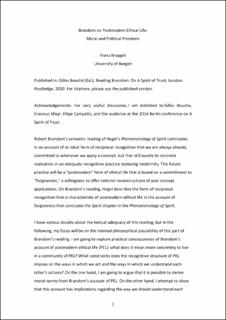| dc.contributor.author | Knappik, Franz Ulrich | |
| dc.date.accessioned | 2021-06-22T10:25:39Z | |
| dc.date.available | 2021-06-22T10:25:39Z | |
| dc.date.created | 2021-01-28T09:40:31Z | |
| dc.date.issued | 2020 | |
| dc.identifier.isbn | 9781138123564 | |
| dc.identifier.uri | https://hdl.handle.net/11250/2760591 | |
| dc.description.abstract | On Robert Brandom’s reading, Georg Wilhelm Friedrich Hegel holds that the conceptual content of language, thought, and action is constituted by normative attitudes, through which participants of a discursive practice assign each other authority and responsibility. Pusillanimity is, on Brandom’s account, the characteristic normative meta-attitude of modernity, which replaces the naive form of magnanimity that had characterized ancient ethical life: a form of magnanimity that simply assumed objective norms as given part of reality. This chapter argues that magnanimous trust has deeply troublesome consequences. These consequences provide moral reasons that speak against any attempt to establish postmodern ethical life (PEL) in real practice. PEL in Brandom’s sense also requires trust in a more ordinary sense, namely that of an attitude of assuming that others will respect other persons’ roles as participants in PEL. | en_US |
| dc.language.iso | eng | en_US |
| dc.publisher | Routledge | en_US |
| dc.relation.ispartof | Reading Brandom: On A Spirit of Trust | |
| dc.title | Brandom on Postmodern Ethical Life: Moral and Political Problems | en_US |
| dc.type | Chapter | en_US |
| dc.description.version | acceptedVersion | en_US |
| dc.rights.holder | Copyright 2020 Routledge | en_US |
| cristin.ispublished | true | |
| cristin.fulltext | postprint | |
| cristin.qualitycode | 2 | |
| dc.identifier.cristin | 1880951 | |
| dc.source.pagenumber | 184-197 | en_US |
| dc.identifier.citation | Gilles Bouché (Ed.), Reading Brandom: On A Spirit of Trust, London: Routledge. 2020, 184-197 | en_US |
